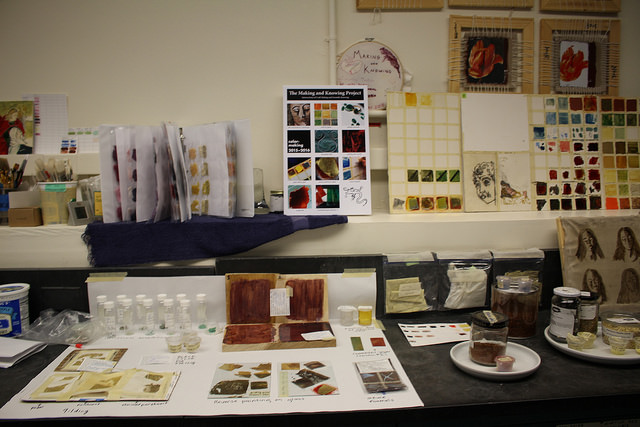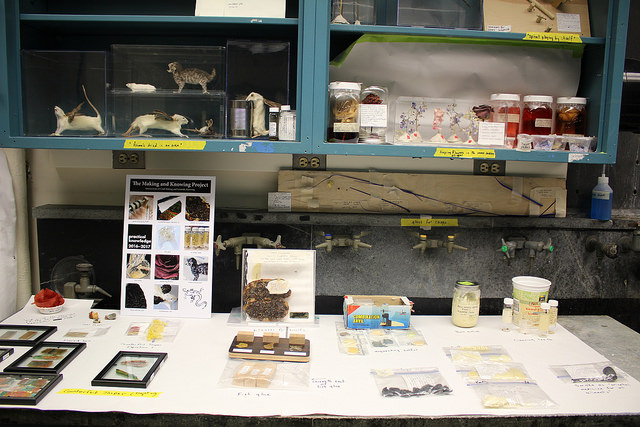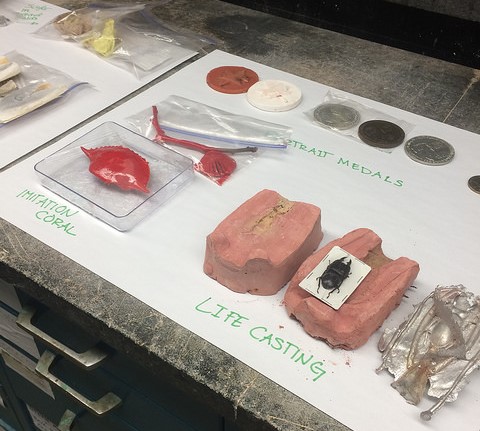Making & Knowing Syllabi
Making and Knowing Project Syllabi
Syllabi from the Making and Knowing Project can be used to suggest possible readings, discussion prompts, model the integration of hands-on activities with seminar-style discussion of relevant concepts and texts, and connect instructors to resources for hands-on activities. These syllabi contain links to the edition’s approximately 130 essays which can be used as course readings or to instruct in reconstructions (also useful for this are field notes). Making and Knowing Syllabi can also be mined for their Lesson Plans, while the Student Projects from Hands-On History courses can be consulted by instructors and students for inspiration in planning papers and projects, and to consider the many ways to engage with Ms. Fr. 640 and the digital edition.

Craft and Science: Making Objects in the Early Modern World (HIST GR8906)
Columbia University, History Department, graduate-level “Lab Seminar”
This Lab Seminar course studies the materials, techniques, settings, and meanings of skilled craft and artistic practices in the early modern period (1350-1750), in order to reflect upon a series of issues, including craft knowledge and artisanal epistemology; the intersections between craft and science; and questions of historical methodology and evidence in the reconstruction of historical experience. The course was run as a “Laboratory Seminar,” with discussions of primary and secondary materials, as well as text- and object-based research and hands-on work in a laboratory. This course contributed to the collective production of the digital critical edition of a late sixteenth-century manuscript, BnF Ms. Fr. 640. Final essays in this course were workshopped and readied for publication as the Research Essays of Secrets of Craft and Nature in Renaissance France.
The course was offered from 2014-18, guided by a different theme each year to help focus research on related techniques described in the manuscript. The syllabi evolved alongside our competence and confidence in working with and thinking through materials, thus the first semesters were quite experimental.
Moldmaking and Metalworking (e.g., portrait medal casting, sand casting, and box molding)
- Fall 2014 HIST GR8906: Moldmaking and Metalworking Syllabus (also available as DOCX)
- Spring 2015 HIST GR8906: Moldmaking and Metalworking Syllabus (also available as DOCX)
Colormaking (including dyes, pigments, artificial gems, coloring woods and metals, and varnish making)
- Fall 2015 HIST GR8906: Colormaking Syllabus (also available as DOCX)
- Spring 2016 HIST GR8906: Colormaking Syllabus (also available as DOCX)
Practical Knowledge: Vernacular Natural History, Practical Perspective, Optics, Mechanics, and Medicine
- Fall 2016 HIST GR8906: Practical Knowledge Syllabus (also available as DOCX)
- Spring 2017 HIST GR8906: Practical Knowledge Syllabus (also available as DOCX)
Ephemeral Art (such as the creation of artworks that were intended to stand outside (like banners) or that aimed to create the visual effect of a more permanent (and expensive) work of art)
- Fall 2017 HIST GR8906: Ephemeral Art Syllabus (also available as DOCX)
Printmaking, Inscription, and Impression
- Fall 2018 HIST GR8906: Impression Syllabus (also available as DOCX)

Making and Knowing in Early Modern Europe: Hands-On History (HIST GU4962)
Columbia University, History Department, advanced undergraduate- / intro graduate-level “Lab Seminar”
This Laboratory Seminar is a re-working of the graduate-level GR8906: Craft and Science, tailored to advanced undergradute and graduate students. This course introduces students to the materials, techniques, contexts, and meanings of skilled craft and artistic practices in early modern Europe (1350-1750). The course is run as a “Laboratory Seminar,” with discussions of primary and secondary materials, as well as hands-on work in the M&K laboratory. This course tested the use of Secrets of Craft and Nature in Renaissance France. A Digital Critical Edition and English Translation of BnF Ms. Fr. 640 in a higher education classroom in part to inform the development of the Making and Knowing Project’s Research and Teaching Companion. Students’ final projects (exploratory and experimental work in the form of digital/textual analysis of Ms. Fr. 640, reconstruction insight reports, videos for the Companion, or a combination) are published as part of the Companion.
- Summer 2021 HIST GU4962: Hands-on History Syllabus (also available as DOCX) (NOTE: this was a six-week intensive course, instructed virtually)
- Fall 2021 HIST GU4962: Hands-on History Syllabus (also available as DOCX)
- Spring 2022 HIST GU4962: Hands-on History Syllabus (also available as DOCX)
- Spring 2023 HIST GU4962: Hands-on History Syllabus (also available as DOCX)
- Fall 2024 HIST GU4962: Hands-on History Syllabus (also available as DOCX)
What is a Book in the 21st Century? Working with Historical Texts in a Digital Environment (HIST GR8975)
Columbia University, History Department, graduate-level “Digital Seminar”
Using the English translation of Ms. Fr. 640 as the basic data set, students collaboratively created a minimal (i.e., limited, basic feature) digital edition by the end of the semester, effectively prototyping a design for the Project’s final digital critical edition. Additionally, the course introduced students both theoretically and practically to the concepts and tools relevant to the creation of a digital edition, such as image and text capture; metadata, tracking, and data management; data curation; transformations to, representations of, and interfaces of digital resources; and archiving, licensing, persistence, and re-usability. The seminar thus equipped participating students with identifiable, measurable, and repurposable digital skills while furthering the Project goals.
- Spring 2017 GR8975: What is a Book? Syllabus (also available as DOCX)
- The students’ resulting Minimal digital edition of the working English translation of BnF Ms. Fr. 640
- See the Course Github Repository
- In collaboration with Columbia’s Center for Teaching and Learning, this course also resulted in the creation of the Digital Literacy Competency Calculator (DLCC), a web-based tool for representing the connection between digital literacy competencies and the teaching and learning practices that produce them. See also the “White Paper: Digital Literacy Competency Calculator: Rationale and Process” and the DLCC for Spring 2017: What is a Book?.
Transforming Texts: Textual Analysis, Literary Modeling, and Visualization (ENGL84031 / HISTGU4031 / COMS4495)
Columbia University, cross-listed in the Departments of English, History, and Computer Science, advanced undergraduate- / intro graduate-level “Digital Seminar”
Designed for graduate and advanced undergraduate students in the social sciences, humanities, and computer science, this Spring 2019 cross-disciplinary course was situated at the crossroads of historical exploration and computer sciences. Students were exposed to digital literacy tools and computational skills through the lens of the Making and Knowing Project. This course built off the Spring 2017: What is a Book? course described above. For the final project, students collaborated to create data-driven projects to investigate Ms. Fr. 640, including through the use of natural language processing and text mining techniques. These Student Projects shed light on topics of interest within the manuscript and uncover connections within the textual data.
- Spring 2019 GU4031: Transforming Texts Syllabus (also available as DOCX)
